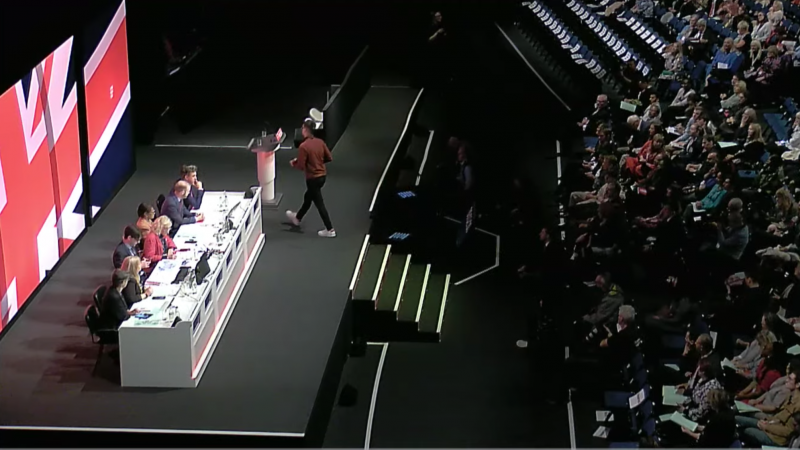
Labour passed a number of constitutional amendments, known as rule changes, at its party conference this year. We run through all the successful ones here. All of the rule changes approved by conference 2022 were put forward by the national executive committee (NEC), Labour’s ruling body, which means they were championed by the leadership.
Card votes are used for policy motions when a show of hands is too close to call, and always used for rule changes because, unlike policies, they are binding. Each Constituency Labour Party (CLP) and affiliate delegation casts votes reflecting the number of members they represent, and these votes are then weighted so that CLPs determine half the result and affiliates (mostly trade unions) the other half.
Card vote one: “language, administrative and regulatory amendments”. (See CAC Report 1 for full details.)
This rule change:
- reinstates the requirement that constitutional amendments to conference be submitted a year in advance, a rule that was abolished under Jeremy Corbyn’s leadership
- confirms the role of the party’s independent complaints board (ICB) in the complaints process
- means that two delegates appointed from each of the national women’s committee, national BAME committee and disabled members committee will be ex-officio members of party conference
- means individual members of Labour groups who do not comply with requests from the NEC, SEC or WEC to stand down from multi-party arrangements within 14 days shall automatically have the whip withdrawn
- makes some general language changes to bring the rulebook up to date
Actual votes cast:
CLP, for: 215,880 (73.71%)
CLP, against: 76,996 (26.29%)
Affiliate, for: 952,769 (59.55%)
Affiliate, against: 647,195 (40.45%)
Overall percentage:
CLP, for: 36.86%
CLP, against: 13.14%
Affiliate, for: 29.77%
Affiliate, against: 20.23%
Total, for: 66.63%
Total, against: 33.37%
Card vote two: “getting general election ready”. (See CAC Report 1 for full details.)
This rule change:
- in relation to by-elections, snap elections or any other parliamentary selection where there is “insufficient time for a normal selection process”:
- defines “insufficient time” for a “normal” parliamentary selection process as when “the NEC, in its opinion, determines that there is insufficient time for a full local selection process, or some other selection process defined by the NEC under its general powers, to take place”.
- confirms that no selection arrangements, shortlisting of candidates or selection of candidates may be undertaken unless the NEC has reviewed the composition of the shortlisting panel and “expressly certified that, in the NEC’s opinion, the shortlisting panel members’ appointment to the shortlisting panel conforms to the party’s obligations under the Equality Act 2010”
- requires the shortlisting panel to “promptly notify” the NEC of any members that it shortlists and before the shortlist is sent to members of the local party
- states that the “powers of the shortlisting panel are subject to the NEC’s powers in chapter 5 of the rule book”
- requires newly elected Labour MPs who hold office as local councillors to resign their local council seats on a date agreed with the Commons chief whip and the general secretary
- in relation to the composition of the ‘Clause V’ meeting, changes the number of trade union representatives from eight to 11 and updates the language used in the rule book from “TULO contact group” to “national TULO committee”
Actual votes cast:
CLP, for: 201,186 (68.43%)
CLP, against: 92,821 (31.57%)
Affiliate, for: 1,558,131 (95.77%)
Affiliate, against: 68,897 (4.23%)
Overall percentage:
CLP, for: 34.21%
CLP, against: 15.79%
Affiliate, for: 47.88%
Affiliate, against: 2.12%
Total, for: 82.1%
Total, against: 17.9%
Card vote three: “conference business”. (See CAC Report 1 for full details.)
This rule change:
- limits CLP delegations to conference to six people
- changes the procedure for electing some of the members of the conference arrangements committee (CAC). Previously, two of the eight members of the CAC were elected by means of a ballot conducted among all eligible individual members of the party by means of a national one-member-one-vote ballot. They will now be elected by their delegations at party conference on a card vote basis
- removes a requirement that CLPs pay any outstanding insurance premiums and other levies before their conference delegation is accepted
Actual votes cast:
CLP, for: 212,214 (72.44%)
CLP, against: 80,728 (27.56%)
Affiliate, for: 1,079,722 (90.85%)
Affiliate, against: 108,725 (9.15%)
Overall percentage:
CLP, for: 36.22%
CLP, against: 13.78%
Affiliate, for: 45.43%
Affiliate, against: 4.57%
Total, for: 81.65%
Total, against: 18.35%
Card vote four: “national Labour Party women’s committee and conference”. This rule change relates to voting procedures at the Labour Party women’s conference and means that CLPs shall cast a vote on the basis of the actual number of fully paid up women members in the CLP at 31 December preceding the conference, where previously a vote was cast on the basis of the actual number of fully paid up members. (See CAC Report 1 for full details.)
Actual votes cast:
CLP, for: 256,677 (93.28%)
CLP, against: 18,489 (6.72%)
Affiliate, for: 110,840 (9.57%)
Affiliate, against: 1,047,181 (90.43%)
Overall percentage:
CLP, for: 46.64%
CLP, against: 3.36%
Affiliate, for: 4.79%
Affiliate, against: 45.21%
Total, for: 51.43%
Total, against: 48.57%
Card vote five: “rules for women’s branches”. This rule change means that women’s branch secretaries and CLP women’s officers will be given “appropriate access” to party systems in order to email women members, intended to “facilitate communication and organisation of the women’s branches”. (See CAC Report 1 for full details.)
Actual votes cast:
CLP, for: 260,560 (93.94%)
CLP, against: 16,821 (6.06%)
Affiliate, for: 1,612,862 (99.88%)
Affiliate, against: 1,875 (0.12%)
Overall percentage:
CLP, for: 46.97%
CLP, against: 3.03%
Affiliate, for: 49.94%
Affiliate, against: 0.06%
Total, for: 96.91%
Total, against: 3.09%




More from LabourList
Turning the page? Labour’s recovery in the polls show a path to 2029 victory
Restoration announce recommendations for NEC candidates
‘Factionalism at the top is weakening Labour – and handing a gift to Reform’